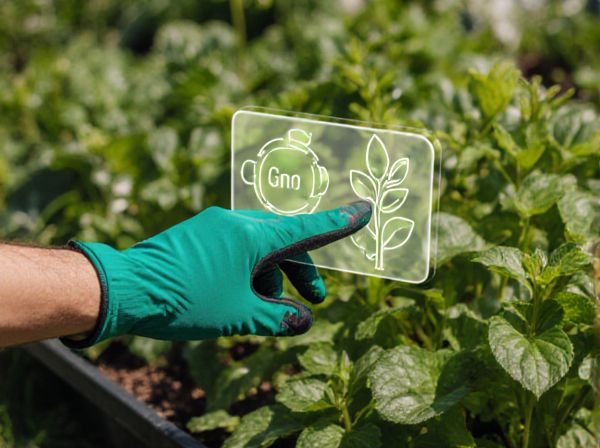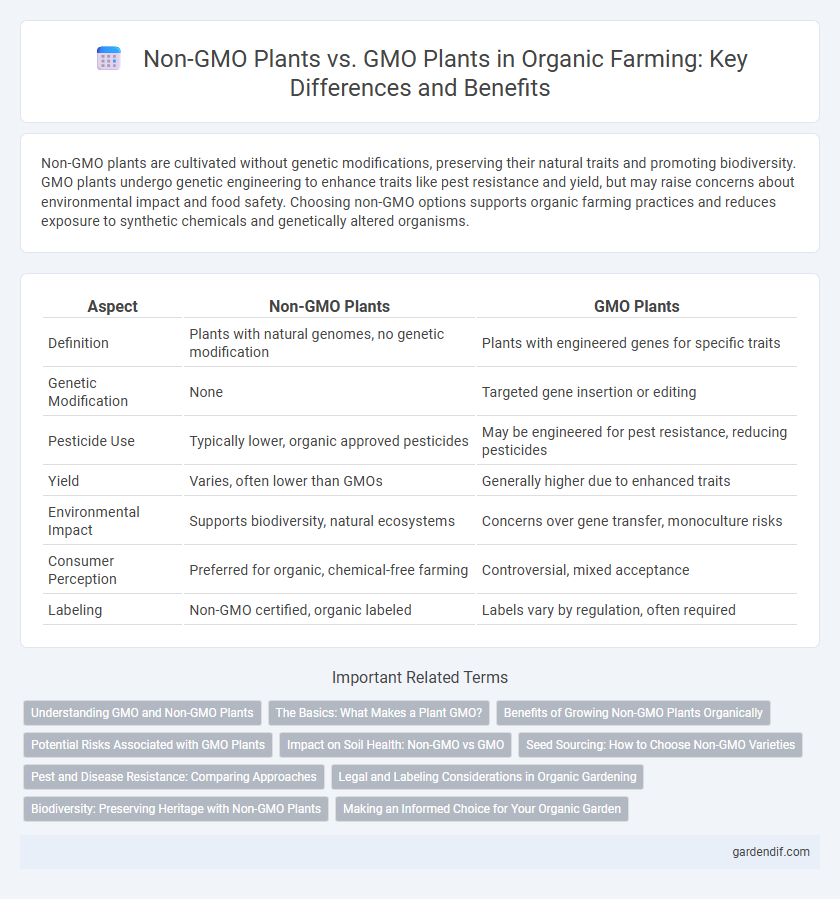
Non-GMO Plants vs GMO Plants Illustration
Non-GMO plants are cultivated without genetic modifications, preserving their natural traits and promoting biodiversity. GMO plants undergo genetic engineering to enhance traits like pest resistance and yield, but may raise concerns about environmental impact and food safety. Choosing non-GMO options supports organic farming practices and reduces exposure to synthetic chemicals and genetically altered organisms.
Table of Comparison
| Aspect | Non-GMO Plants | GMO Plants |
|---|---|---|
| Definition | Plants with natural genomes, no genetic modification | Plants with engineered genes for specific traits |
| Genetic Modification | None | Targeted gene insertion or editing |
| Pesticide Use | Typically lower, organic approved pesticides | May be engineered for pest resistance, reducing pesticides |
| Yield | Varies, often lower than GMOs | Generally higher due to enhanced traits |
| Environmental Impact | Supports biodiversity, natural ecosystems | Concerns over gene transfer, monoculture risks |
| Consumer Perception | Preferred for organic, chemical-free farming | Controversial, mixed acceptance |
| Labeling | Non-GMO certified, organic labeled | Labels vary by regulation, often required |
Understanding GMO and Non-GMO Plants
Non-GMO plants are cultivated without genetic modifications, preserving their natural DNA and maintaining traditional breeding methods, while GMO plants have specific genes altered through biotechnology to enhance traits like pest resistance or crop yield. Understanding the distinction involves recognizing that non-GMO crops rely on natural genetic variation, whereas GMO plants introduce targeted gene sequences from other species to achieve desired characteristics. This genetic manipulation in GMO plants raises debates about environmental impact, biodiversity, and food safety compared to non-GMO cultivation practices.
The Basics: What Makes a Plant GMO?
A genetically modified organism (GMO) plant contains DNA that has been altered using genetic engineering techniques to introduce specific traits such as pest resistance or herbicide tolerance. Non-GMO plants are grown from seeds that have not undergone any genetic modification and retain their natural genetic makeup, often preferred in organic farming for their perceived safety and environmental benefits. The key difference lies in the manipulation of genetic material in GMO plants to achieve targeted results, which is absent in non-GMO plant breeding methods.
Benefits of Growing Non-GMO Plants Organically
Growing non-GMO plants organically enhances soil health by maintaining natural microbial diversity and reducing chemical inputs, which fosters sustainable ecosystems. Organic non-GMO cultivation supports biodiversity by protecting native species and minimizing environmental contamination from synthetic pesticides or genetically modified traits. Consumers benefit from nutrient-rich produce free from genetic modification concerns, aligning with increasing demands for transparency and natural food sources.
Potential Risks Associated with GMO Plants
Genetically modified organism (GMO) plants pose potential risks including gene transfer to non-GMO crops, which may lead to biodiversity loss and the evolution of herbicide-resistant weeds. Scientific studies indicate that GMO crops can impact soil health by altering microbial communities essential for nutrient cycling. Consumer concerns also highlight allergenicity and long-term environmental effects that remain insufficiently understood, emphasizing the need for rigorous risk assessments in GMO cultivation.
Impact on Soil Health: Non-GMO vs GMO
Non-GMO plants often contribute to healthier soil ecosystems by supporting biodiversity and promoting natural nutrient cycles without reliance on synthetic chemicals. In contrast, GMO plants engineered for herbicide tolerance or pest resistance can lead to increased chemical use, potentially degrading soil microbial diversity and structure over time. Maintaining soil health requires careful management of planting strategies, with non-GMO crops generally favoring more sustainable soil conservation practices.
Seed Sourcing: How to Choose Non-GMO Varieties
Choosing non-GMO plant varieties involves sourcing seeds from certified organic or non-GMO seed suppliers who provide transparent labeling and third-party verification. Prioritize heirloom or open-pollinated seeds that have not been genetically modified to ensure purity and maintain biodiversity. Understanding seed provenance and certification standards helps protect against inadvertent GMO contamination and supports sustainable agricultural practices.
Pest and Disease Resistance: Comparing Approaches
Non-GMO plants rely on natural breeding techniques and biodiversity to enhance pest and disease resistance, often resulting in more resilient ecosystems and reduced chemical usage. GMO plants are engineered with specific genes that provide targeted resistance to pests and diseases, offering immediate protection but raising concerns about long-term ecological impacts and pest adaptation. Both approaches aim to improve crop protection, but their effectiveness and sustainability vary depending on environmental conditions and agricultural practices.
Legal and Labeling Considerations in Organic Gardening
Non-GMO plants are legally required to meet strict organic certification standards, ensuring no genetic modification during cultivation. GMO plants lack organic certification and are subject to specific labeling laws prohibiting their inclusion in organic products. Labeling regulations mandate clear disclosure for GMO content, protecting consumer rights and maintaining transparency in organic gardening markets.
Biodiversity: Preserving Heritage with Non-GMO Plants
Non-GMO plants maintain genetic diversity crucial for ecosystem resilience and adapting to environmental changes, preserving heritage varieties that have evolved over centuries. GMO plants, often genetically uniform, can reduce biodiversity by dominating agricultural landscapes and limiting the survival of heirloom species. Protecting non-GMO plants supports biodiversity conservation, sustaining agricultural ecosystems and cultural heritage seeds for future generations.
Making an Informed Choice for Your Organic Garden
Non-GMO plants preserve natural genetic integrity, supporting biodiversity and reducing potential health risks linked to genetically modified organisms. GMO plants, engineered for traits like pest resistance and higher yields, may contribute to agricultural sustainability but raise concerns about environmental impact and long-term effects. Making an informed choice for your organic garden involves evaluating these factors alongside personal values about ecological balance and food safety.
Non-GMO Plants vs GMO Plants Infographic

 gardendif.com
gardendif.com